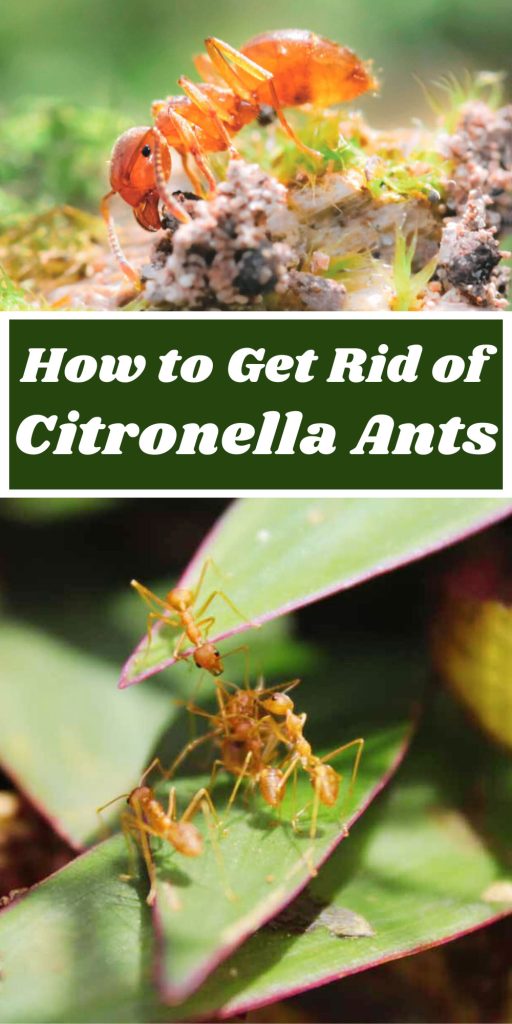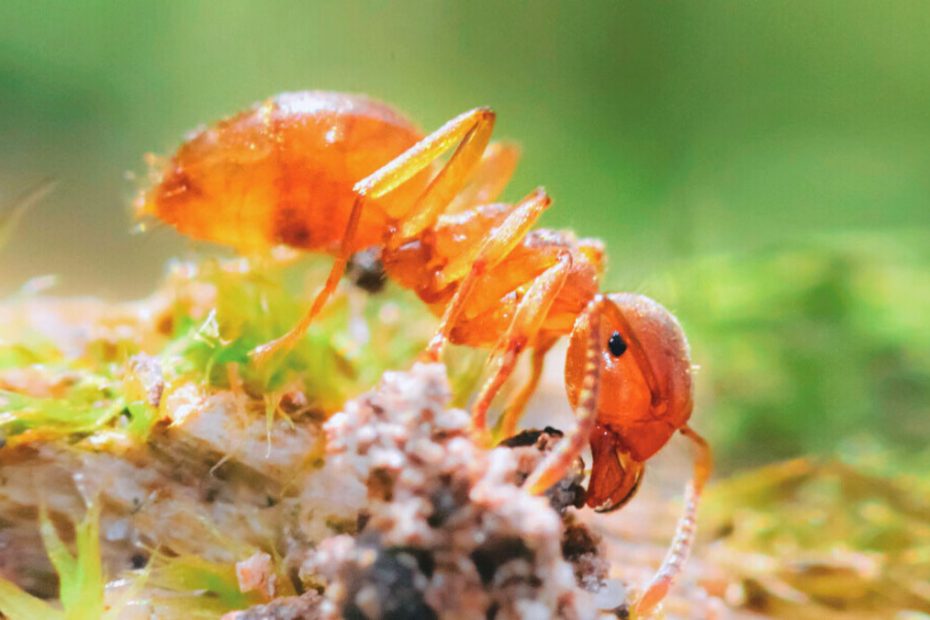You’ve probably noticed a distinct lemony scent wafting through your home and discovered citronella ants as the culprits. These small, yellowish ants can be quite the nuisance, especially when they invade in large numbers. While they’re not harmful, their presence can be bothersome and challenging to eliminate.
Understanding how to get rid of citronella ants requires a mix of prevention and targeted treatment. By identifying their nests and using the right methods, you can reclaim your home from these unwelcome guests. Let’s jump into some effective strategies to help you tackle this problem head-on.
Key Takeaways
- Understand Citronella Ants: Citronella ants, known scientifically as Lasius interjectus, are small, yellowish ants emitting a lemony odor when crushed. Although harmless, they can be a nuisance in large numbers.
- Identify Infestation Signs: Common indicators of a citronella ant infestation include swarms of winged ants, a noticeable lemony scent, and small soil mounds or nests in your yard or garden.
- Preventive Measures: To prevent citronella ant invasions, secure vulnerable areas like basements, kitchens, windows, and bathrooms; remove food sources; seal entry points; eliminate moisture; and maintain cleanliness.
- Effective Removal Techniques: Employ a mix of natural remedies (e.g., diatomaceous earth, essential oils, boiling water) and chemical treatments (e.g., ant baits, insecticide sprays) to eliminate citronella ants. For persistent infestations, consider professional pest control services.
- Long-Term Solutions: Ensure consistent ant management through routine inspections, moisture control, cleanliness, proper landscaping, and sealing all potential entry points to maintain a pest-free home environment.

Understanding Citronella Ants
Citronella ants, small and yellowish, emit a distinct lemony scent when crushed. Even though being harmless, their presence can be a nuisance, especially when they invade homes in large numbers.
What Are Citronella Ants?
Citronella ants, scientifically known as Lasius interjectus, are named for their citrus-like smell.
Key Characteristics:
- Appearance: They are yellow to light brown and about 4 to 4.5 mm in length.
- Scent: When crushed, they release a lemony odor.
- Habitat: Typically nest in soil, under rocks, or in decaying wood.
Common Signs of Infestation
Identifying a citronella ant infestation early can help you manage the situation more effectively.
- Winged Ants: Swarms of winged citronella ants inside or near your home indicate the presence of a colony.
- Lemony Scent: A noticeable lemony smell, especially around entry points, signals their presence.
- Nest Sites: Look for small soil mounds or nests in the yard, garden, or under stones and logs.
By understanding the characteristics and signs of citronella ants, you can better observe and address potential infestations, safeguarding your home from these persistent pests.
Preventive Measures
Employing preventive measures secures your home from citronella ants, ensuring long-term protection.
Identifying Vulnerable Areas
Discovering and securing areas prone to ant invasions mitigates initial risks. Focus on these common locations:
- Basement: Inspect for cracks in walls and foundations.
- Kitchen: Check for food spills or improperly sealed containers.
- Windows and Doors: Ensure these have functional seals and no gaps.
- Bathroom: Look for leaks around sinks and tubs.
By addressing these areas, you create a less attractive environment for citronella ants.
Environmental Adjustments
Environmental changes significantly deter citronella ants. Carry out these adjustments:
- Remove food sources: Store food in airtight containers, clean spills promptly, and dispose of garbage regularly.
- Seal entry points: Use caulk or weather stripping to close gaps in windows, doors, and foundations.
- Eliminate moisture: Repair leaks, use dehumidifiers, and ensure proper ventilation to reduce dampness.
- Maintain cleanliness: Regularly sweep, mop, and vacuum to remove crumbs and debris.
Making these changes discourages citronella ants from establishing nests in your home, promoting a pest-free environment.
Effective Removal Techniques
To eliminate citronella ants from your home, use a mix of natural remedies, chemical treatments, and professional pest control methods depending on the severity of the infestation.
Natural Remedies
Employ natural remedies for a safer, eco-friendly approach to control citronella ants:
- Diatomaceous Earth: Spread diatomaceous earth around entry points. This natural powder dehydrates ants, effectively killing them.
- Essential Oils: Use essential oils like peppermint, eucalyptus, or tea tree. Mix with water in a spray bottle and apply to ant trails.
- Citrus Peels: Place citrus peels near suspected entry points. The strong scent repels citronella ants.
- Boiling Water: Pour boiling water directly into ant mounds outside your home. This method kills ants on contact.
Chemical Treatments
Chemical treatments offer a more potent solution for severe infestations:
- Ant Baits: Use ant baits containing boric acid or hydramethylnon. Worker ants carry the poison back to the nest, affecting the colony.
- Insecticide Sprays: Apply insecticide sprays formulated for ants along baseboards, windowsills, and entry points. Ensure proper ventilation during use.
- Granules: Spread ant-killing granules around the perimeter of your home. Granules target ants outside before they enter.
- Dusts: Use insecticidal dusts like permethrin in cracks and crevices. Dusts offer long-lasting protection in hidden areas.
Professional Pest Control
When infestations persist even though DIY methods, enlist professional pest control services:
- Inspection: Professionals conduct thorough inspections to identify ant colonies and nesting sites.
- Customized Treatments: Pest control experts create customized treatment plans based on the specific ant species and infestation severity.
- Ongoing Maintenance: Service providers offer ongoing maintenance to prevent future infestations. Regular check-ups ensure long-term protection.
- Advanced Solutions: Professionals use advanced tools and chemicals unavailable to the public, ensuring a more effective eradication process.
By combining these strategies, control citronella ants and reclaim your living space from these persistent pests.
Long-Term Solutions
Long-term solutions are essential for preventing citronella ant infestations and maintaining a pest-free home environment. This section offers detailed strategies for consistent ant management.
Maintenance and Monitoring
Regular maintenance and thorough monitoring help keep citronella ants at bay. Here’s what you need to focus on:
- Routine Inspections: Check basements, kitchens, bathrooms, and other vulnerable areas for any signs of ants. Look for small soil mounds, winged ants, or a lemony smell.
- Moisture Control: Fix leaks in pipes, roofs, and basements. Use dehumidifiers and ensure proper ventilation to reduce moisture levels.
- Cleanliness: Keep your home clean, especially areas where food is prepared and consumed. Wipe down surfaces, clean floors, and store food in airtight containers.
- Landscaping: Maintain a clean yard. Trim vegetation near the home’s foundation, remove decaying wood, and manage mulch and compost piles properly.
Consistent implementation of these practices helps create an inhospitable environment for citronella ants.
Sealing Entry Points
Prevent citronella ants from invading your home by sealing potential entry points. Address the following areas:
- Windows and Doors: Inspect and replace damaged seals around windows and doors. Use weather stripping and door sweeps to eliminate gaps.
- Foundation Cracks: Seal cracks and gaps in the foundation using silicone caulk or expanding foam.
- Utility Lines: Cover gaps around utility lines, such as plumbing, electrical wiring, and HVAC systems, to prevent ant access.
- Vents and Openings: Install mesh screens over vents and other openings to block entry pathways.
By effectively sealing these entry points, you can significantly reduce the likelihood of citronella ants entering your home.
Conclusion
Effectively managing citronella ants requires a proactive approach that combines prevention and targeted treatment. By understanding their characteristics and signs of infestation, you can take timely actions to safeguard your home. Implementing preventive measures like sealing entry points and maintaining cleanliness will help create an inhospitable environment for these pests.
When dealing with an existing infestation, use a mix of natural remedies and chemical treatments based on the severity. If DIY methods aren’t enough, don’t hesitate to seek professional pest control services for comprehensive solutions. Consistent maintenance and monitoring will ensure your home remains a pest-free sanctuary.
Frequently Asked Questions
What are citronella ants and why are they a problem?
Citronella ants are small, yellowish ants known for their lemony scent. They arenât harmful but can become a nuisance when they invade homes in large numbers.
How can I identify citronella ants?
Look for small, yellowish ants with a lemony smell, winged ants, and small soil mounds near nest sites.
Where are citronella ants most likely to nest?
Citronella ants typically nest in soil, often found near foundations, basements, kitchens, windows, doors, and bathrooms.
What signs indicate a citronella ant infestation?
Common signs include a noticeable lemony smell, the presence of winged ants, and small soil mounds around nest sites.
How can I prevent citronella ants from entering my home?
Seal entry points, maintain cleanliness, remove food sources, eliminate moisture, and regularly inspect vulnerable areas like basements and kitchens.
What natural remedies can help control citronella ants?
Natural remedies include diatomaceous earth, essential oils, citrus peels, and boiling water.
When should I consider chemical treatments for citronella ants?
Consider chemical treatments like ant baits, insecticide sprays, granules, and dusts for more severe infestations.
Is it necessary to hire professional pest control services?
If DIY methods fail, professional pest control services are recommended. They offer thorough inspections, customized treatment plans, and ongoing maintenance.
What long-term solutions help prevent citronella ant infestations?
Regular maintenance and monitoring, sealing entry points, controlling moisture, proper landscaping, and maintaining cleanliness help prevent long-term infestations.
Can citronella ants cause structural damage to my home?
No, citronella ants do not cause structural damage but their presence can be bothersome if not controlled.
